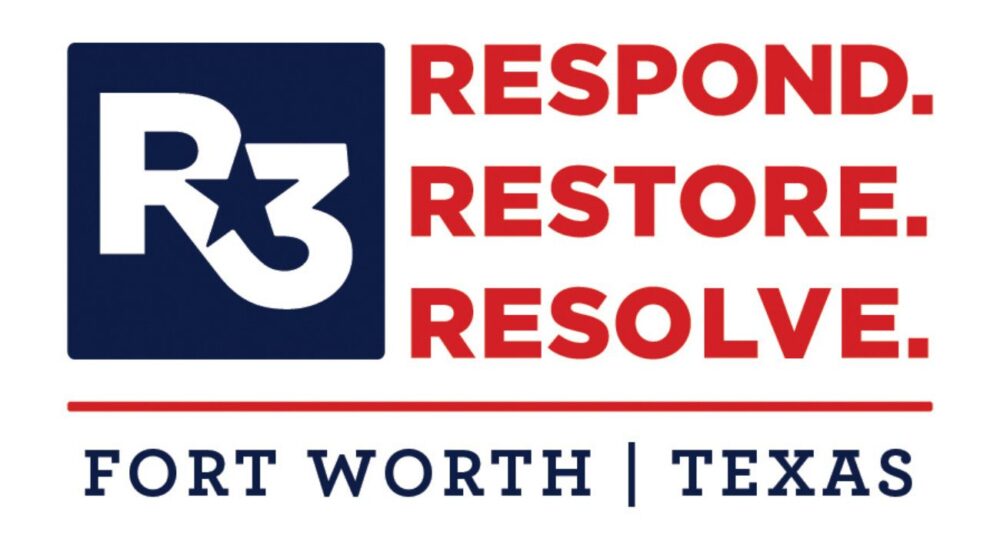Police officers and firefighters are more likely to die by suicide than in the line of duty.
This according to the Suicide Prevention Resource Center — which is why the City of Fort Worth is launching its first-ever initiative to focus on the mental health of first responders in the city.
The new program, called “R3,” short for “Respond. Restore. Resolve.,” hopes to revolutionize first responder wellness.
“Part of being a first responder is you have to be able to compartmentalize or you wouldn’t be able to function,” says a first responder in an R3 video.
“Doing this line of work and seeing everything that we see causes damage to us. We don’t always see that damage because we’re always gearing up to head out for the next one. So, we just tuck it away and don’t deal with it,” says another first responder in the video.
The program partners with the American Warrior Association to host advanced, peer-led training sessions to provide first responders with a way to process the trauma they see day-to-day on the job and focus on their well-being.
“I would say it’s normal for everybody to have some trauma in their life,” said Cliff Weaver, chaplain for the Fort Worth Fire Department, in an interview with The Dallas Express. “You see a dead body maybe once or twice in your life, or have something traumatic happen. Our first responders are seeing that stuff daily, and most of the time, multiple times a day.”
When most people go through a traumatic event, they are able to take the time they need to process and heal. For first responders, that is not the case.
“It’s hard enough for the general population when someone dies and they have to be around it,” said Weaver. “But that’s just part of our job, what we’re doing every day.”
The R3 program seeks to confront an invisible wound, one borne from the critical decisions and actions inherent in first responder work.
The trainings involve a weeklong stay at a ranch where participants engage in various sessions aimed at fostering healing through understanding, peer support, and mental health care strategies.
Weaver was part of the first group of ten first responders who went on a weeklong trip.
“It sounds crazy to say, but I think that was probably the first time in most of our careers where we had that amount of time to do nothing but focus on the trauma that we’ve seen, and intentionally go through a curriculum that helps us release some of that,” he told DX. “And, really, guys lives are changed. They come back different.”
He commented on the initial apprehension among first responders regarding the program, attributing it to the importance of teaching them to release the stigma surrounding taking care of their own mental well-being.
“Nobody wants to feel like they’re not okay,” he said. “We really have to reduce the stigma around it.”
Weaver explained that one of the most impactful parts of the program was being able to process some of the false narratives in their lives that lead first responders to feel as if they are not enough or worthy of a good life due to the things that they have been through.
A 2022 study published in Front Health Serv found that first responders are at high risk for disorders that arise from repeated exposure to stress and trauma. Although mental health treatments are available, first responders often do not access them due to barriers that include lack of knowledge, stigma, negative experiences with mental health providers, and time-based burdens.
The R3 program is unique because of the way that it brings together first responders from different departments.
“It’s going to be monumental. It really is,” Weaver told DX. “It really is a national model that we’re building out. What does it look like for all the first responders in one city to address this issue we all face together?”
R3 is not the only program in Texas for first responders.
In 2020, the Center for Health Systems Analytics within the McWilliams School of Biomedical Informatics at the University of Texas Health Science Center at Houston collaborated with other organizations to launch the Heroes Helpline, “a free, confidential service implemented to help first responders across Texas who may be experiencing symptoms of mental health or substance use disorders.”
The school also offers “First Responder Behavioral Health Training,” the purpose of which is “to provide first responders across Texas with information regarding substance use and mental health disorders.”
Modules for first responders include “substance use disorder in the first responder workforce” and “understanding and coping with anxiety,” aimed at helping first responders cope with symptoms of anxiety, chronic stress, and post-traumatic stress disorder.

